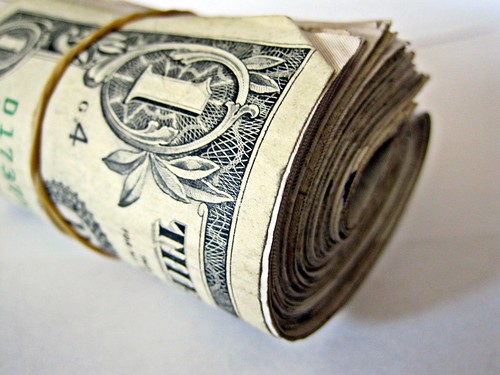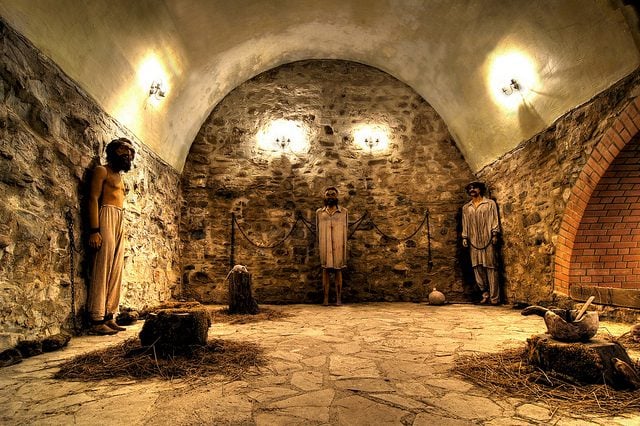
I am the rich young ruler.
And so are you.
In the context of our world, we are all rich young rulers. If you make a mere $34,000 a year, you are part of the elite economic class, the wealthiest of the wealthy, the top 1 percent of humanity’s 7 billion people.
In this light, there a few passages in the Scriptures more troubling than Jesus’ exchange with the rich young man in the gospels. As the world’s rich, few of Jesus’ words sting more than his words to the rich man.
We can believe that the meek will inherit the earth, that we should love our neighbors, that we should turn the other cheek, that we should pick up our crosses and follow Jesus. We can keep these commandments, much as the rich young ruler kept all the commandments.
But give away our wealth? Live in solidarity with the world’s poor and oppressed? There is no way to read the story of the rich young ruler without a sinking feeling in my spirit, because I know Jesus is talking to us.
Like the rich man in the story, we are the ones who have, who have amassed fortunes and possessions more than we can count. Possessions we love, protect, serve, and spend money to insure against loss, rot, theft and damage. In our consumeristic culture, we are not what we eat. We are what we buy. We are defined by our possessions, and we define our worth by what we can possess. Our closets full of clothes sewn with injustice define us as rich young rulers. Our pantries and refrigerators with food seeded with environmental degradation and human oppression reveal us as rich young rulers. Our multi-car garages filled with cars barely a year, two years old, proclaim who we really are.
We are the world’s rich young rulers, pushing around shopping carts and ruling the world with hegemonic purchasing power.
Like he tells the rich man in the story, Jesus speaks to we Christians today who so fastidiously try to live into our faith. Jesus tells us to leave our wealth, to give it up, to share it with the world and, in doing so, follow him into an eternal life.
And, to me, our true identity as the world’s wealthy is why we spiritualize this story. We want to blunt the edges of Jesus’ sharp rebuke of wealth so we can barely feel it prick our skin when, in fact, it should gouge us to the bone.
This is when our understanding of this story, I’m convinced, breaks down.
In the story in Mark’s gospel, after Jesus (slips a new commandment into the Decalogue) tells him he must sell all he has and give to the poor in order to inherit life everlasting, the rich man goes away stunned and grieving because he was so wealthy.
We have been taught the rich man goes away sad because he refuses to sell his possessions and let go of his wealth. He loves money more than he loves God. Because he cannot serve both God and mammon, the rich man chooses mammon and leaves, rejecting Jesus’ command to sell his fortune.
This is the only interpretation I’ve ever heard theologians and pastors offer. But it’s not an interpretation that is necessarily indicated by the text. We fill in the blanks and assume that the rich man’s sadness is the same as a rejection of Jesus.
This narrow interpretation reveals not just a lack of imagination on our part. It reveals, more importantly, our own bias for the wealthy, as the world’s wealthiest. Because of our own wealth and love of money, we cannot fathom an ending other than one in which the rich mans remains rich. We cannot imagine a rich man would willingly sell his possessions to follow Jesus. We cannot do so precisely because we hold so tightly to our own possessions and wealth. We cannot imagine selling our own stuff and giving the money to the poor, so surely this must be the case with the rich man in the story.
We can only imagine how sad we would be if we really thought Jesus meant what he said to the rich man.
We can only imagine how much we would grieve if we had to choose between God and mammon. Because we know which we would choose, and it isn’t God. We know that because we choose it every day.
But what if the opposite is true in this story? What if the rich man goes away sad precisely because he has chosen God over mammon? What if he is sad because he is going away to sell all his possessions and give the money to the poor in order to follow Jesus? What if he is dejected because he finally knows the cost of following God and he intends to do it? What if he grieves because he has resolved that the first thing he will do when he returns to his vast home is begin to strip it of its finery, its wealth and comfort and begin to redistribute it to the poor, from the 1 percent to 99?
What if he is sad because he is losing everything, his entire identity?
What if he is sad because he plans to leave his house, his brothers, his sisters, his mother, his father, his wife, his children and his fields for the sake of the Good News?
What if it this Good News that makes him so sad?
What if the rich man really did sell everything?
To me, this is the power of the story. That the rich young ruler doesn’t go away sad, to return to a life of wealth and luxury that will dull the harsh words of a homeless rabbi, but that he goes away sad because he is going to do exactly what Jesus has called him to do.
My guess is that we don’t want to hear this reading, because it fundamentally changes what Jesus’ speech at the end of story means. In the traditional reading of this text, in which the rich man goes away sad because he has rejected Jesus’ challenge, Jesus goes on to offer the easy, miraculous out, absolving the rich man (and us by proxy). Jesus explains that though it is extremely difficult for a rich man to enter the kingdom of heaven, what is impossible for us is possible for God.
In other words, reading the exchange traditionally, we get to have it both ways. We can recognize our greed and exploitative wealth, but not do anything about it because we trust in God’s grace to do what we cannot do on our own. We can look at our prized possessions and paychecks and be thankful that, though it is impossible for us to give away all that we have as Jesus asks, we can still enter into God’s kingdom, for all things are possible for God.
But if we dare to read the text differently, in which the wealthy man is saddened but resolved to sell his possessions and follow Jesus, suddenly the Jesus’ speech transforms into something different, a continuation of the challenge to the rich man rather than an absolving golden parachute. Indeed, it is hard for a rich man to enter the kingdom of God! Just look how much grieving, sadness and depression it causes this rich man. Look how much he must squeeze from his life simply to be able to follow Jesus through the eye of the needle. Yes, selling one’s possessions, giving to the poor and entering into solidarity with the have-nots is impossible for us to do alone. It is only with God’s help that we can do like the rich man and realize that our wealth is costing us a life lived eternally in the kingdom of God.
It is only with the help of a kenotic God who empties God’s self completely that one can begin to become empty as well.
But don’t make the mistake of thinking that such a radical act will always, or even mostly, be filled with happiness and bliss. Don’t think that just because we would follow Jesus, that all sadness will disappear, that every tear will be wiped away. Indeed, if we follow Jesus’ lead, we will one day find ourselves shouting, “Enough! Why have you forsaken me God?!”
Don’t think that the Good News, like our possessions, is here to make us happy.
Rather, for we rich young rulers, this Good News is bound to make us sad, for we have many, many possessions.












